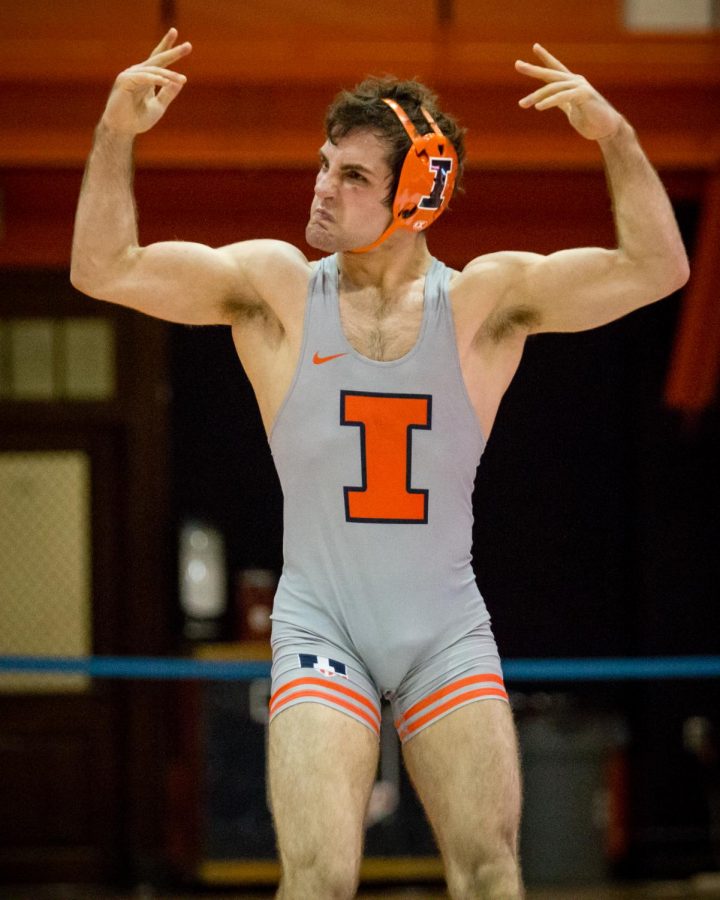Olympic Training Begins for Zane Richards
Illinois’ Zane Richards celebrates after defeating Michigan’s Stevan Micic in the 133 pound weight class during the match at Huff Hall on Friday, January 20. Richards won by decision and the Illini defeated the Wolverines 34-6.
February 5, 2018
For most college athletes, graduation means the end of competitive play in their respective sport and the beginning of new adventures.
But not for Illini alumnus Zane Richards.
Richards remains dedicated to his wrestling career, which most recently saw him spending this past January training in Vladikavkaz, Russia, with one of the most decorated and prestigious wrestling clubs in the world.
“The purpose for the trip was to get a different look at wrestling and see how they train out in Russia,” Richards said. “There’s plenty of elite clubs around the area, but this one had the most combined world championships and gold medals out of the three. We thought it was a good idea to train with a club that prestigious and see what we could do with our training to adjust and learn in the three weeks that we were there.”
The 5-foot-3, 133-pound wrestler had one of the most successful wrestling careers at Illinois. He attended the camp in Russia to prepare for his biggest challenge yet: the 2020 Olympics in Tokyo.
Get The Daily Illini in your inbox!
“We’re training to bring home a gold medal, and that’s what a camp like this one is for,” Richards said. “It’s to get better, keep training and sharpen my wrestling for these next couple of years until it’s time to really perform.”
Practices were intense. A typical day saw the athletes getting up at 7 a.m. to get fresh air, loosen up a little bit and get ready for training. Breakfast is served by the coaches at 8:30 a.m., and the first round of practice begins at 11 a.m.
“The first practice is usually going to be around 2 1/2 hours,” Richards said. “We get a 20-minute warmup in, drill for about 10-15 minutes, and then they have you wrestle live in different freestyle situations.”
On top of that, the coaches concluded each practice with a couple more matches. After practice would end, nearly every wrestler remained in the gym for an extra 45 minutes to an hour, going through more drills or other exercises.
“It’s strange because these guys were doing extra drills and exercises that we would usually do, but everyone in the gym was doing it. They were getting all this extra work in without any of the coaches having to ask for it,” Richards said.
Lunch was served at 2:30 p.m., and Richards only had a couple hours of rest before he would pick it back up with his second practice at 5:30 p.m. The second practice usually ran like the first, although with less individual matches at the end and more drilling based on different wrestling situations. In total, Zane would face up to five hours of drilling combined with a few freestyle matches each day.
The camp took a relatively different approach to wrestling than most camps would. The practices were held on Mondays, Tuesdays, Thursdays and Fridays, with most Wednesday’s being spent to rest, relax, and play other leisurely sports. The off days were relaxed and the environment was friendly, but a full practice saw Richards wrestling up to six matches in one day.
“Make no mistake, those guys wrestle hard”. Richards said. “The coaches were a little bit more casual, usually leaving us to fill out the different positions and figure out things on our own. It wasn’t as technique driven as much as it was an open ended environment. Usually you just pick a partner based on what position you wanted to work on, and the coaches would provide technical assistance whenever they felt they needed to.”
The matches themselves are where the true intensity of the camp showed out. Wrestlers could go entire matches without scoring. Keeping a big lead was just as difficult as getting one. Gaining a dominant position didn’t guarantee scoring, and an opportunity like that presented itself a few times each match. The margin for error in each match was nearly non-existent, and each match Richards competed in meant he would be pushing himself to his limits and beyond.
“I’ve learned that I need to work on a lot of things, both defensively and offensively. There’s a lot of things that I didn’t notice after wrestling the same guys here for six years. There’s different ways to look at wrestling, how to score points, and how to wrestle in different positions that you need to go outside of your bubble to experience. Having experienced those things, my wrestling overall is just better for it,” he said.
@jaredefarmer







